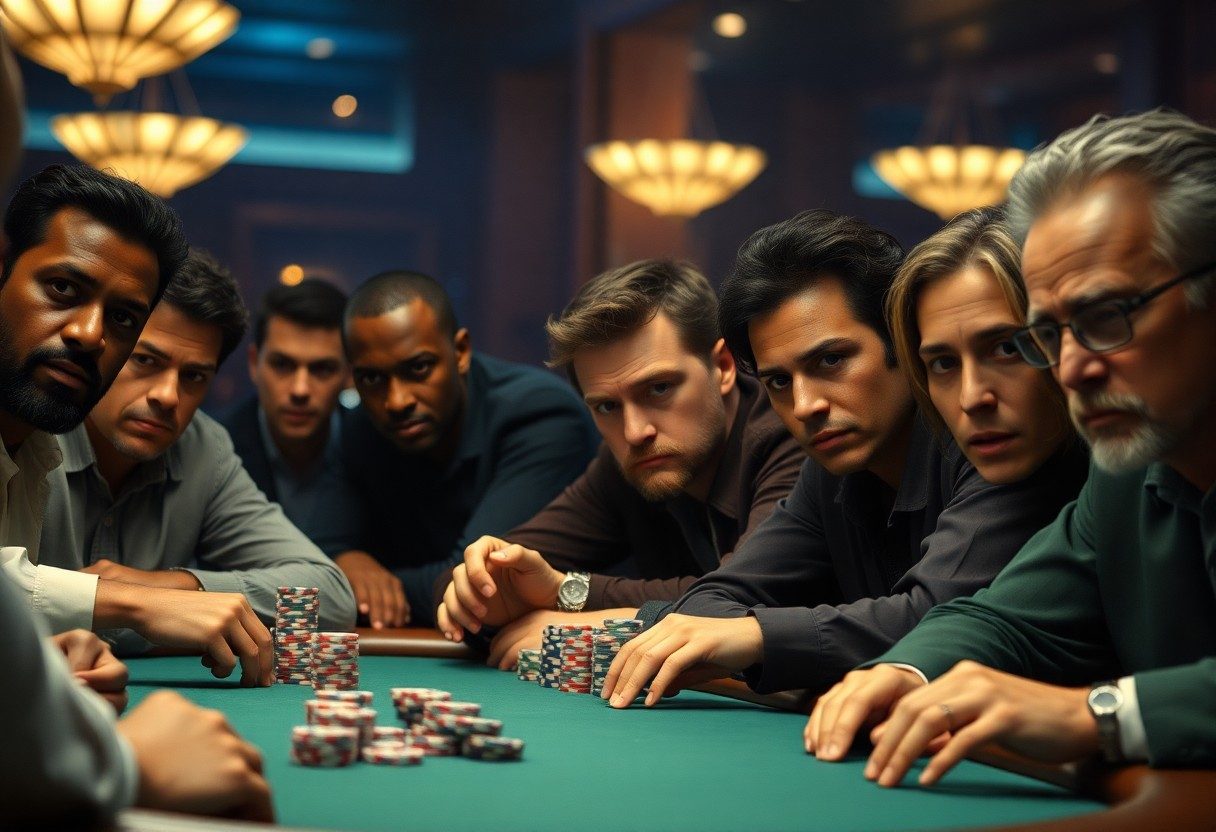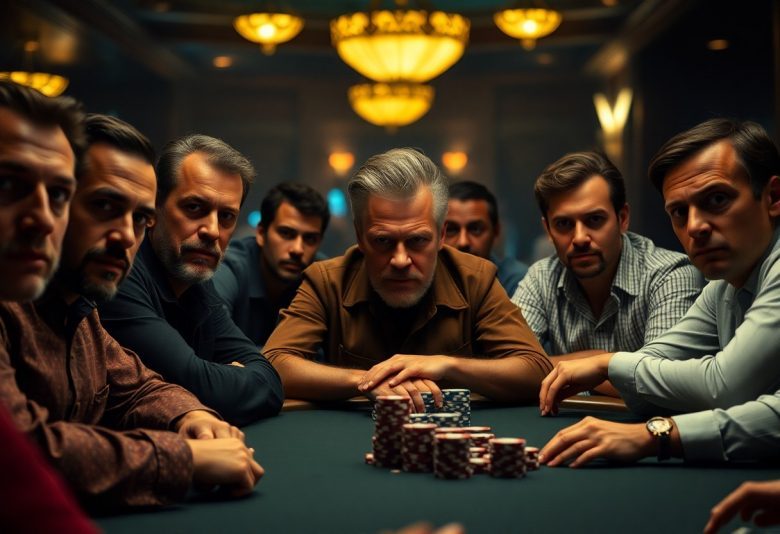With your ability to read opponents and manipulate their perceptions, psychological warfare becomes a potent tool in poker. You can utilize strategies like bluffing, understanding body language, and controlling your own demeanor to influence decisions at the table. This blog post explores how you can leverage mental tactics to gain an advantage, while also highlighting the risks involved in playing mind games. Dive in to discover techniques that can elevate your game and help you stay steps ahead of the competition.
Understanding Psychological Warfare in Poker
The essence of poker transcends beyond just cards; it investigates deep into the intricacies of human behavior. In poker, players not only compete against their opponents’ cards but also engage in a silent battle of wits, emotions, and strategies. This mental aspect transforms the game into a psychological arena, where understanding your opponents’ mindsets can significantly enhance your chances of victory.
The Role of Psychology in Decision Making
Between the highs and lows of betting, every decision in poker is influenced by psychological factors. Your ability to read opponents, manage your own emotions, and maintain composure under pressure can dictate the choices you make. When you grasp the psychological tendencies at play, you empower yourself to make more calculated and strategic decisions at the table.
Common Psychological Tactics Employed by Players
Around the poker table, players often capitalize on psychological tactics to outsmart their opponents. These techniques can include bluffing, maintaining a stoic demeanor, or employing reverse psychology to manipulate the game’s flow. Understanding these tactics can give you a profound edge in your gameplay.
Common psychological tactics in poker involve methods like bluffing, where players project confidence to mislead their opponents about the strength of their hands. Utilizing body language effectively plays a significant role—staying calm and collected can create an air of uncertainty for your opponents. Additionally, reverse psychology can be a game-changer; for instance, if you seem hesitant, opponents might overestimate their hands and make rash decisions. Recognizing and mastering these tactics can elevate your game, allowing you to manipulate situations to your advantage.

Reading Opponents: The Art of Observation
While mastering poker involves understanding the cards, reading your opponents is equally vital. Your ability to observe and interpret signals from fellow players can provide you with invaluable insights into their strategies and mindset. By honing this skill, you can predict their moves and make more informed decisions at the table, ultimately gaining a competitive edge.
Identifying Tells and Patterns
With keen observation, you can learn to identify tells—subtle physical cues or behavioral patterns that reveal the strength of your opponent’s hand. These tells could manifest as changes in breathing, gestures, or even speech patterns, indicating whether they are bluffing or holding a strong hand.
Utilizing Body Language to Gain Insights
Before you act, pay close attention to your opponents’ body language. Non-verbal cues can provide a wealth of information about their confidence and intentions. Noticing shifts in posture, eye contact, or even fidgeting can help you gauge whether they are feeling calm or nervous, giving you the chance to adjust your strategy accordingly.
Consequently, being attuned to body language can be a game changer in poker. If you notice your opponent’s hands are shaking or they’re avoiding eye contact, they might be uncomfortable with the strength of their hand, hinting that they could be bluffing. On the other hand, if they’re sitting confidently with an aggressive posture, they may believe they have the upper hand. By interpreting these signals, you can position yourself to make more strategic decisions, enhancing your likelihood of success at the table.
Bluffing: A Key Strategy in Psychological Warfare
Despite the technical aspects of poker, the foundation of success often lies in psychology. By employing bluffing, players create uncertainty and manipulate their opponents’ perceptions. This strategy can lead to substantial gains when executed effectively, showcasing the intricate dance between risk and reward in the high-stakes world of poker.
Types of Bluffs and When to Use Them
Against seasoned players, knowing which bluff to employ can make all the difference. Here’s a breakdown of common bluff types and their strategic applications:
| Type of Bluff | When to Use |
| Continuation Bluff | On the flop after raising pre-flop |
| Stone Cold Bluff | When you have a weak hand |
| Value Bluff | In position with a strong draw |
| Check-Raise Bluff | When your opponent is aggressive |
| Reverse Bluff | When your opponent expects you to fold |
After understanding these types of bluffs, you can select the most suitable option based on your opponents’ tendencies and the table dynamics.
The Psychology Behind Successful Bluffing
Bluffing involves not just skill, but a deep understanding of your opponents. By gauging their emotional states and interpreting body language, you can achieve a psychological edge that goes beyond the cards dealt. Success hinges on your ability to create doubt and influence decisions, making your opponent second-guess their choices.
It is vital to recognize that the psychology behind successful bluffing is rooted in understanding human behavior. When you bluff, you’re not merely trying to persuade your opponent to fold; you’re tapping into their insecurities and exploiting their decision-making processes. By building a narrative around your hand and maintaining a consistent persona at the table, you put your rival in a position to fail by sowing seeds of uncertainty. This mental game is what elevates bluffing from a simple card tactic to a profound psychological strategy.
Building and Maintaining a Table Image
Once again, your table image plays a vital role in the psychology of poker. Establishing a solid and cohesive persona allows you to influence the decisions of your opponents. Whether you choose to be viewed as loose and aggressive or tight and conservative, consistently portraying your chosen image helps control the flow of the game, creating opportunities to exploit weaknesses in your adversaries’ strategies.
The Importance of Perception in Poker
Behind every smile, bluster, and stoic stare at the poker table lies a battle of wits. Your opponents’ perceptions of you directly affect their gameplay, influencing their bets, folds, and even bluff decisions. If they perceive you as a tight player, they may attempt to push you out of pots. Conversely, you can capitalize on being seen as a loose player, as they may call your bets believing they have the upper hand.
Strategies for Crafting a Compelling Table Persona
About your table persona: creating an impression that aligns with your long-term strategy is necessary. You should be aware of how your actions, speech, and behavior can shape this image. Intentionally mixing up your play style can help confuse your opponents, but staying true to an overarching theme or character you want to project is equally important.
In addition to consciously crafting a persona, implementing varied strategies is key. You can adopt specific patterns in your betting behavior, such as bluffing occasionally to maintain an air of unpredictability. Observing your opponents and adjusting your play based on how they perceive you can keep them guessing. Equally, make use of table talk to create an image of confidence or intimidation. By successfully managing your table persona, you can place pressure on your opponents and enhance your chances of reaping the rewards of your mental game.
Emotional Control: Staying Zen at the Table
Many successful poker players recognize that emotional control is important for achieving consistent results. Staying calm and composed during the ups and downs of the game allows you to read your opponents more effectively and make informed decisions. By cultivating a Zen-like mentality, you can maintain focus and minimize the impact of external distractions, ultimately improving your overall performance at the table.
Managing Tilt and Emotional Responses
At the poker table, feeling frustrated or angry after a bad beat can lead to tilt, which compromises your decision-making ability. To combat this, it’s important to acknowledge your emotional responses without letting them dictate your actions. By taking a moment to breathe deeply and reassess the situation, you can regain control and return to a focused mindset, preventing costly mistakes stemming from impulsive reactions.
Techniques for Staying Focused Under Pressure
Before you sit down at the table, consider employing various techniques to keep your mind clear and your focus sharp. Meditation, mindfulness, and deep breathing exercises can significantly enhance your ability to remain calm under pressure. Additionally, visualizing positive outcomes and setting specific goals for your sessions can help maintain your motivation. Implementing these practices into your routine enables you to navigate high-stakes situations with confidence and poise, setting you apart from opponents who may falter under stress.
Control your mental space by incorporating these techniques into your poker routine. When feeling overwhelmed, take a moment to engage in deep breathing or visualization, as this can eliminate negative thoughts and place you back in a productive mindset. Regular practice of these methods reinforces mental resilience and prepares you to face challenging scenarios with a strong foundation. The more adept you become at managing your emotions, the better you will perform – even when the stakes rise and pressure builds.
To wrap up
To wrap up, as you investigate into the art of poker, understanding psychological warfare can significantly elevate your game. By mastering techniques such as reading your opponents, controlling your emotions, and employing strategic bluffing, you can create an environment of uncertainty for your adversaries. Use these insights not just to influence their decisions, but also to refine your overall strategy. Ultimately, harnessing these psychological elements enhances your ability to gain the upper hand, making every hand you play a true test of wit and mind.




